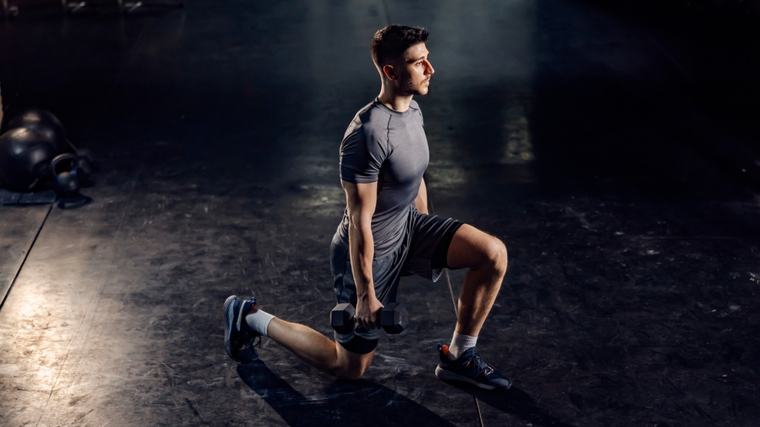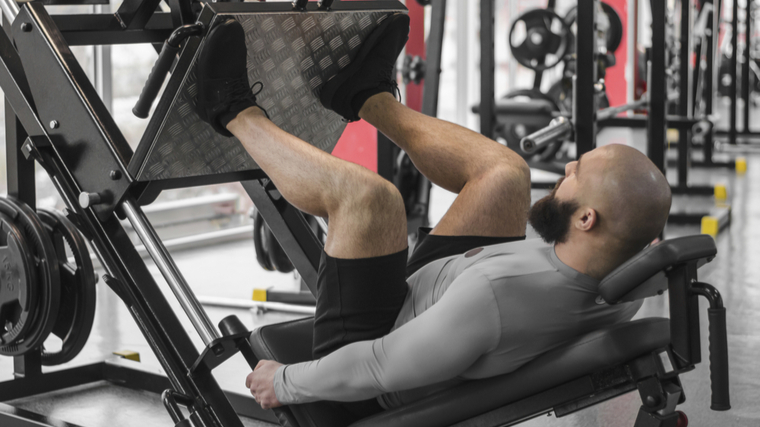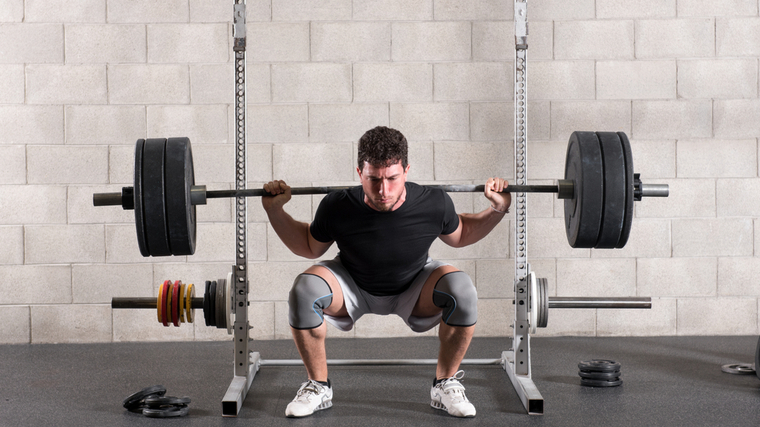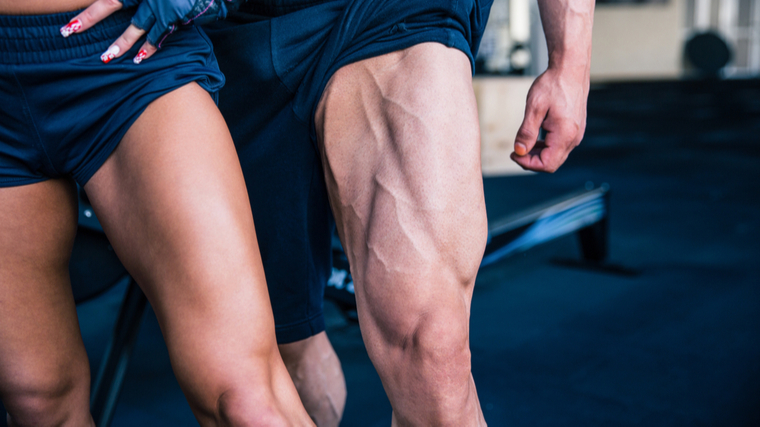Originally Posted At: https://breakingmuscle.com/feed/rss
Leg workouts have a well-earned reputation for being one of the most intense sessions a lifter can put themselves through. Because the legs are a group of several muscles instead of one single body part, a complete leg day requires plenty of work applied to plenty of exercises.
Here are some of the best workouts to hit your legs hard no matter your training situation — at home, on the road, or if you’re just looking for a new way to pack on size and strength.
The Best Leg Workouts
- Best Leg Workout With Dumbbells
- Best Bodyweight Leg Workout
- Best Leg Workout for Size
- Best Leg Workout for Strength
Best Leg Workout With Dumbbells
Leg day is often a chance to use a wide range of equipment at the gym. Every standard commercial gym has various machines to target specific leg muscles, a behemoth of a leg press, and the tried and true squat rack. But if you don’t have access to all the fun stuff, you don’t have to sacrifice results.
Whether you’re training at home with a few dumbbells or you’re in a barebones hotel gym, you can get a serious leg workout.
The Dumbbell-Only Leg Workout
A few pairs of dumbbells or a pair of adjustable dumbbells are all you need to target each leg muscle with high-intensity exercises. Because the legs are powerful and can typically move more weight than most dumbbells allow, this workout focuses primarily on single-leg exercises to reap more benefit from relatively lighter weights.

This routine can be done twice per week if it’s the only leg training in your program or it can be used as an additional leg workout to complement your current plan.
Single-Side Walking Lunge
- How to Do it: Begin standing with a dumbbell in each hand at your sides. Take one large step forward and descend into a deep lunge position. Keep your head and shoulders above your hips, not leaning forward. Press through the front foot to rise while pulling your back leg forwards. Your entire body should be a short distance from where you began. Step forward again with the same leg for the target reps before switching sides.
- Sets and Reps: 3 x 10-15 per leg.
- Rest Time: No rest between legs, 60 seconds between sets.
Dumbbell Squat
- How to Do it: Stand with a dumbbell in each hand. Keep your arms straight and your feet roughly hip-width apart. Keep a neutral spine without rounding forward. Push your hips back to squat halfway down, pause briefly, then return upright. Next, squat as low as your mobility allows, and stand upright again. This is considered one full rep using the “one and a half rep” method.
- Sets and Reps: 4 x 8-10
- Rest Time: 90 seconds between sets.
Split-Stance Dumbbell Romanian Deadlift
- How to Do it: Begin standing with a dumbbell in each hand at your sides. Take a small step backwards into a staggered stance. If you were on a clock face, have one foot at 11 and the other at 5 (after switching sides, you’d be on 1 and 7). Keep a slight bend in your front leg. Push your hips back and bend at your waist. You should feel tension in the hamstrings of your front leg. Avoid rounding your spine. Flex your glutes and hamstrings to pull your torso upright. Your feet shouldn’t move until all reps are completed.
- Sets and Reps: 3 x 8-10 per leg.
- Rest Time: No rest between legs, 60 seconds between sets.
Leaning Single-Leg Calf Raise
- How to Do it: Stand at arms-length to a wall with one hand palm-flat against the wall. Hold one dumbbell in your free hand by your side. Bend your wall-supporting arm until your entire forearm is on the wall and your body is leaned forward at a slight angle. Keep your body straight from your feet to your shoulders. Raise as high as possible onto the toes of the foot under the dumbbell. Hold the peak contraction for three seconds before lowering.
- Sets and Reps: 3 x 10-15 per leg.
- Rest Time: No rest between legs or sets.
Best Bodyweight Leg Workout
Some lifters’ legs may be capable of squatting hundreds of pounds and leg pressing even more, but with the right exercise choices, you can get an intense and effective lower body workout without any weights.
Bodyweight-only training is most often associated with upper body workouts filled with dips, chin-ups, and push-up variations, but any lifter can get a serious leg workout using more than high-rep bodyweight squats or miles of walking lunges.
The Simple and Effective Bodyweight Leg Workout
This bodyweight-only routine prioritizes single-leg exercises, long time under tension in each set, and explosive movements to burn the quadriceps, hamstrings, and glutes.
This style of training, using unfamiliar exercises and high-intensity techniques, can often create a surprising amount of muscle soreness in the days following the workout. Train hard, recover properly, and stick with the plan to see results. Go through the complete workout once every four to seven days.
Bulgarian Split Squat
- How to Do it: Put one foot behind you on a bench, chair, low table or other study object below knee-height. Stabilize your body. Squat down until your rear knee is nearly touching the floor. Reaching straight ahead while leaning slightly forward can help to maintain balance. Pause at the bottom for two seconds. Keep your foot flat as you straighten your leg. Lower halfway down before rising up again. This is one full rep using the “one and a half rep” method.
- Sets and Reps: 4 x 6-8 per leg.
- Rest Time: 15 seconds rest between legs, 60 seconds between sets.
Reverse Lunge
- How to Do it: From a standing position, take one large step backwards with one foot. Descend into a lunge position. Don’t allow your upper body to lean while stepping back. Return to a standing position and pull your back leg forward. Perform all reps on one leg. Use the same leg to perform reps of the next exercise before switching sides.
- Sets and Reps: 3 x 10-12 per leg.
- Rest Time: No rest before moving to the next exercise, working the same leg.
Single-Leg Romanian Deadlift
- How to Do it: From a standing position, take a small step backwards into a staggered stance, stepping with the same foot as the previous exercise. Keep a slight bend in your front leg. Push your hips back and bend at your waist. Feel tension in the hamstrings of your front leg. Pause briefly before flexing your glutes and hamstrings to pull your torso upright. Perform all reps with one leg forward before performing a set of the previous exercise on the opposite leg.
- Sets and Reps: 3 x 10-12 per leg.
- Rest Time: 60 seconds before returning to the previous exercise, performing a set on the opposite leg.
Leg Matrix
- How to Do it: This isn’t one single exercise, but is a four-exercise circuit popularized by Coach Alwyn Cosgrove. Perform standard bodyweight squats, followed immediately by alternating lunges (step with one leg, descend, stand upright and return to center, step with your other leg, descend, repeat), followed immediately by jumping alternating lunges (as the previous exercise with an added jump into the air to as you switch legs), ending with jumping squats (standard bodyweight squats, jumping into the air on each rep).
- Sets and Reps: 1 x 24 reps of each exercise (12 lunges per leg, 24 total reps). If you somehow manage to complete all 96 reps in less than 90 seconds, which is top-level performance, rest three minutes and repeat the circuit for one additional set.
- Rest Time: No rest between exercises.
Best Leg Workout for Size
“Leg day” is a phrase which strikes fear into even the most experienced lifters. Because the legs are a relatively large muscle group, you need to include multiple exercises to avoid neglecting any part of the lower body. That means you’re in for a lot of work with a lot of intensity and a lot of muscle-burning reps.

Many lifters over-focus on the quadriceps and neglect their hamstrings and calves, but a complete training session addresses them all. Under-trained muscles remain smaller and weaker than muscles that get worked. Since most people want to wear shorts in public once in a while without feeling self-conscious, here’s a size-building program to build a solid set of legs.
Legendary Leg Day
This once-per-week workout uses classic exercises, simple techniques like supersets and peak contractions, and old fashioned hard work to grind out muscle-building reps. The last few reps of each set should be extremely challenging while maintaining good form. Reach near-complete muscular failure on the very last rep of each set.
Back Squat
- How to Do it: Setup in a squat rack with the bar positioned across the back of your shoulders. Unrack the bar by taking one small step backwards. Set your feet outside-hip width. Keep your lower back locked and your chest up. Aim to reach a parallel depth (having your hips level with your knees) for optimal muscle recruitment. Pause briefly before standing up.
- Sets and Reps: 4 x 8-12
- Rest Time: 90 seconds between sets.
Leg Curl
- How to Do it: Set up on either a seated or lying leg curl machine. Adjust the pads to contact slightly above your heels. Bend only at your knees without moving your upper body. Contract your hamstrings fully, until the leg pad is either in contact under the seat frame (for seated leg curls) or in contact with your glutes (for lying leg curls). Hold for two seconds before slowly extending your legs under control.
- Sets and Reps: 4 x 10-12
- Rest Time: No rest before moving to the next exercise.
Leg Extension
- How to Do it: Sit on a leg extension machine. Set the shin pads just above your ankles. Think of your shoelaces floating to the ceiling while straightening your legs to raise the weight. Don’t allow your glutes or hips to leave the seat. Hold the peak contraction for two seconds before lowering the weight under control.
- Sets and Reps: 4 x 10-12
- Rest Time: 60 seconds before returning to the previous exercise.
High-Stance Leg Press
- How to Do it: Sit in a leg press machine and set your feet outside shoulder-width relatively high on the platform. This stance activates more glutes and hamstrings. Keep your feet flat while pressing through your heels to full lockout. Lower the weight as far as your mobility allows. Keep your lower back in contact with the seat throughout the set. Repeat reps steadily without pausing in either the locked out or the stretched positions.
- Sets and Reps: 3 x 12-15
- Rest Time: 60 seconds between sets.
Seated Calf Raise
- How to Do it: Sit in a seated calf raise station. Unlock the weight and lower your heels to a comfortable stretch position. Pause for two seconds. Raise onto your toes as high as possible. Pause for two seconds before lowering to the next rep.
- Sets and Reps: 3 x 15-20
- Rest Time: 30 seconds between sets.
Best Leg Workout For Strength
A strong lower body can often be an indicator of total body strength, since many upper body exercises are hindered by a weak lower body. In short: When in doubt, get really strong legs because they improve pretty much everything else.
Stronger Legs, Stronger Body
This strength-focused workout is centered around the classic barbell back squat. Not only is it, arguably, the most popular of the “big three” powerlifts, it has also been shown to benefit athleticism. (1) (2)

Use this program once per week, ideally after a rest day to avoid cumulative fatigue and allow maximum focus.
Back Squat
- How to Do it: Setup in a squat rack with the bar positioned across the back of your shoulders. Unrack the bar by taking one small step backwards. Set your feet outside-hip width. Keep your lower back locked and your chest up. Aim to reach a parallel depth (having your hips level with your knees) for optimal muscle recruitment. Pause briefly before standing up.
- Sets and Reps: 5 x 3-5
- Rest Time: Three minutes between sets.
Romanian Deadlift
- How to Do it: Begin with a barbell at waist-height using a palms-down (pronated) grip. Set your feet shoulder-width apart. Retract your shoulder blades and brace your core. Keep your back in a neutral position while pushing your hips back and bending at the waist. Lower the bar until you feel maximum tension in the hamstrings and glutes. Contract the target muscles and return to an upright standing position.
- Sets and Reps: 4 x 6-8
- Rest Time: Three minutes between sets.
Step-Up
- How to Do it: Begin with a bench or steps at roughly knee-height placed in front of you. Hold a pair of dumbbells in each hand, hanging at your sides. Place one foot on top of the platform. Focus on pressing through the top foot with little to no assistance from the foot on the ground. Keep your shoulders back and resist leaning. Pause briefly at the top before lowering under control. Letting your body free fall to ground-level decreases muscular stress and increases joint impact.
- Sets and Reps: 3 x 6-8 per leg.
- Rest Time: 60 seconds between legs, 60 seconds between sets.
The Leg Muscles
Training your “legs” is like training your “back.” It’s almost always considered one body part for training purposes. In reality, it’s a collection of multiple muscles which need to be recruited with a variety of exercises.

Knowing exactly what muscles make up your lower body is essential to getting the best results, building more muscle, and increasing overall strength.
Quadriceps
Being the large muscles on the front of the thigh, your quadriceps are responsible for movement at the knee to extend and straighten your leg. The “quad” in quadriceps refers to the four muscles that function together — the rectus femoris, vastus lateralis, vastus medialis, and vastus intermedius.
Generally speaking, the muscles are recruited and activated similarly during quadriceps-focused exercises. However, some research has shown that certain heads may be recruited differently with specific techniques. (3) (4)
This type of finely targeted training can be useful for competitive bodybuilders and high-level aesthetic lifters, but the vast majority of lifters in the gym can build exceptional muscular development without over stressing about hitting one head of the quads more than another.
Hamstrings
The hamstrings are a multi-headed muscle on the back of the upper leg. It consists of three different sections — the biceps femoris, semimembranosus, and semitendinosus. The hamstrings are responsible for bending the knee, as well as extending the hips.
Because the hamstrings control two different types of movements, exercises like leg curls and deadlift variations are both necessary for total recruitment and maximum development.
Glutes
The glute maximus, glute medius, and glute minimus combine to form eye-catching glutes. The glutes primarily function in hip extension, to pull the legs and torso into a straight line. They’re also heavily recruited in rotating and moving the leg from the hip joint.
Due to the glutes’ relative size and attachment points, they can be some of the most pound-for-pound powerful muscles in your body. While heavy lifting certainly isn’t the only way to train, direct glute exercises have the potential to move higher poundages than direct training for other body parts.
Calves
The calves are made of the soleus and gastrocnemius on the back of the lower leg. Both work to extend the ankle and foot. The gastrocnemius attaches above the knee while the soleus is entirely below it. Due to this unique division, the soleus is prioritized when the knee is bent (during seated calf raises) while both muscle heads work during straight-legged calf raises.
Warming Up the Legs
Because the legs involve multiple muscles and multiple joints, a thorough warm-up is mandatory. Addressing the hips, knees, and ankles can lead to improved range of motion, optimal performance, and reduced risk of injury.
The Full Leg Warm-Up
- Squat to Calf Raise: With your feet shoulder-width apart, squat down to a comfortable depth. Pause briefly before standing. Transition directly into a calf raise, rising onto both toes. Hold the top position briefly before returning to a squat position. Repeat for 10 reps.
- Standing Knee Raise: From a standing position, bring one bent leg up to waist-level in front of your body. Keep your torso over your hips without leaning excessively forwards or backwards. Complete a total of 20 reps, alternating legs each rep.
- Squat to Stand: Stand with your feet beyond shoulder-width apart. Reach forward to touch your toes. Slightly rounding your back is acceptable because the spine isn’t under any load. Next, drop your hips down into a deep squat position. Your knees should end up outside of your arms. Stay in the bottom position and raise both hands overhead. Stand up while keeping both arms up. Lower your arms to your sides and repeat the process for five reps.
Leg Day Every Day?
“Skipping leg day” has become in-gym shorthand for avoiding hard work, but if you want impressive results, going through hard work is unavoidable. You’re now armed with plenty of options to get the job done, no matter your goal and no matter your gym. There are no excuses left to skip leg day.
References
- Chelly MS, Fathloun M, Cherif N, Ben Amar M, Tabka Z, Van Praagh E. Effects of a back squat training program on leg power, jump, and sprint performances in junior soccer players. J Strength Cond Res. 2009 Nov;23(8):2241-9. doi: 10.1519/JSC.0b013e3181b86c40. PMID: 19826302.
- Crewther, B. T., Kilduff, L. P., Cook, C. J., Middleton, M. K., Bunce, P. J., & Yang, G. Z. (2011). The acute potentiating effects of back squats on athlete performance. Journal of strength and conditioning research, 25(12), 3319–3325. https://doi.org/10.1519/JSC.0b013e318215f560
- Stoutenberg M, Pluchino AP, Ma F, Hoctor JE, Signorile JF. The impact of foot position on electromyographical activity of the superficial quadriceps muscles during leg extension. J Strength Cond Res. 2005 Nov;19(4):931-938. doi: 10.1519/r-16364.1. PMID: 16437818.
- Signorile JF, Kacsik D, Perry A, Robertson B, Williams R, Lowensteyn I, Digel S, Caruso J, LeBlanc WG. The effect of knee and foot position on the electromyographical activity of the superficial quadriceps. J Orthop Sports Phys Ther. 1995 Jul;22(1):2-9. doi: 10.2519/jospt.1995.22.1.2. PMID: 7550299.
Featured Image: restyler / Shutterstock
The post The Best Leg Workouts With Bodyweight, With Dumbbells, for Size, and More appeared first on Breaking Muscle.
Filed under: Fitness

 For now classes are 6pm and 640pm at 2840 Wildwood st in the Boise Cloggers studio.
Book your class NOW!
click this ==>
For now classes are 6pm and 640pm at 2840 Wildwood st in the Boise Cloggers studio.
Book your class NOW!
click this ==>








